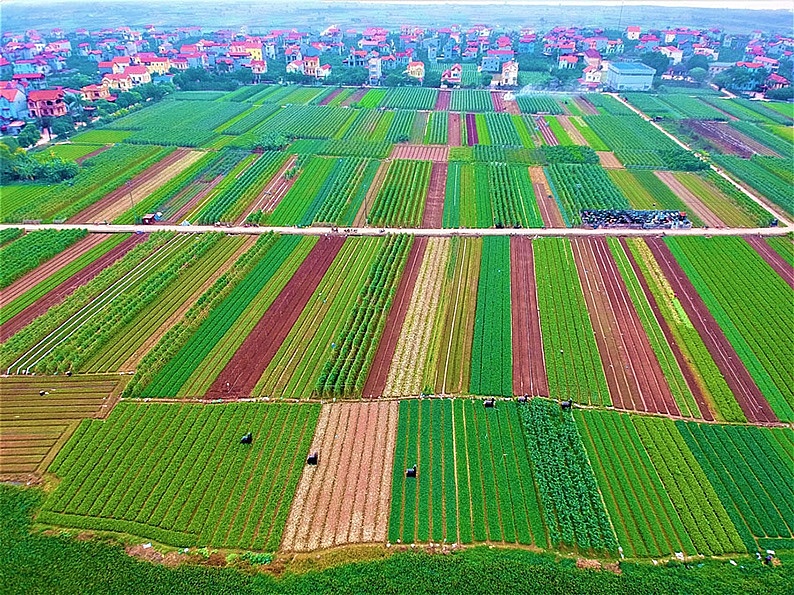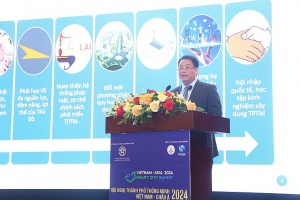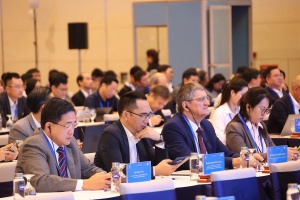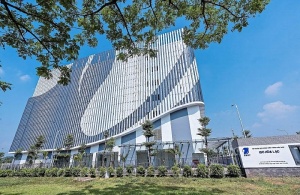Hanoi advances large-scale agricultural production
Specialised agricultural production areas are forming, focusing on rice cultivation, aquaculture, fruit orchards, and concentrated livestock farming, with increasing scale in Chuong My district.
High-quality rice cultivation zones cover over 5,000 hectares, while 800 ha are dedicated to Dien pomelo orchards. Concentrated livestock farming has expanded to 582 large-scale farms located outside residential areas. Initial efforts have established production-consumption chains for key agricultural products such as vegetables, rice, and livestock, enhancing the value of the agricultural sector.
Additionally, Chuong My has developed collective brands for five products: Chuong My pomelo, Dong Phu organic rice, Japonica organic rice from Nam Phuong Tien-Chuong My, Chuc Son vegetables, and Nam Phuong Tien pomelo.
According to the district's Economic Office, Chuong My has introduced high-tech agricultural models with significant results. These include orchid cultivation using tissue culture and temperature control systems in greenhouses in Thuy Huong commune, high-tech Dien pomelo production, and vegetable and fruit cultivation, yielding annual incomes of VND500-600 million ($20,833–$25,000) per ha.
Similarly, Phuc Tho district has approximately 480ha of concentrated safe vegetables, 454ha of flowers and ornamental plants, 1,002ha of fruit trees, and 3,063ha of high-quality rice. Many agricultural products have been recognised with collective trademarks, including Phuc Tho pomelo, Tam Van pomelo, van Nam bananas, and products like wild pork from Nguyen Hung Co., Ltd., Phuc Tho organic pork, and Xuan Phu vegetables. To secure product output, the district has supported cooperatives in establishing eight agricultural production-consumption chains.
 |
| Concentrated agricultural zones in Me Linh district, Hanoi |
The development of concentrated agricultural zones not only enables farmers to improve productivity and product quality but also facilitates traceability for regulatory authorities.
According to Hanoi’s Department of Agriculture and Rural Development, the city is transitioning over 40,227ha of rice fields into new agricultural production models, including high-quality rice (15,600ha), safe vegetables (nearly 3,000ha), and fruit orchards (7,400ha).
Vu Thi Huong, director of the Hanoi Agricultural Promotion Centre under Hanoi Department of Agriculture and Rural Development, stated that the city has established 285 high-tech agricultural models, encompassing 185 in crop cultivation, 45 in livestock farming, 54 in aquaculture, and one integrated crop-livestock model.
These models, primarily located in districts like Me Linh, Gia Lam, Thuong Tin, Dong Anh, Thanh Oai, and Dan Phuong, are proving economically viable and aligning with Hanoi’s unique conditions, solidifying their market position. Furthermore, the city has formed large-scale concentrated livestock farming zones, ensuring disease safety.
The shift towards large-scale safe agricultural production is transforming traditional farming practices, compelling farmers to comply with technical procedures and yielding 10-15 per cent higher economic efficiency compared to traditional methods.
To further promote large-scale agricultural production, Nguyen Xuan Dai, director of Hanoi Department of Agriculture and Rural Development, said the department continues to collaborate with localities to implement comprehensive agricultural development plans, including slaughtering and processing, and managing the production and distribution of safe vegetables. Efforts also focus on expanding concentrated production zones linked to high-tech applications, organic agriculture, and advanced quality management systems.
Additionally, investments are being channelled into improving food safety and hygiene conditions in slaughtering, processing, preservation, and trading of agricultural, forestry, and aquatic products. Enterprises are guided and supported in investing in agriculture, forming partnerships, and replicating safe agricultural supply chains.
Hanoi is also restructuring its crop production to enhance land-use efficiency. This involves reducing rice cultivation areas, focusing on high-quality rice varieties, expanding vegetable and flower farming, and converting rice fields in water-scarce areas to more economically valuable crops.
Simultaneously, the city aims to restructure the agricultural sector and revive growth by boosting production efficiency, increasing product value, and expanding markets. These efforts are designed to improve living standards, ensure robust food security, and build a sustainable, high-productivity, environmentally friendly agricultural system resilient to climate change and integrated into the global economy.
 | Hanoi’s smart city vision hinges on data development Data has been identified as a cornerstone for unlocking new growth opportunities in digital government, the digital economy, and digital society. |
 | Driving innovation in urban sustainability The Vietnam-Asia Smart City Summit 2024 is taking place from December 2-3, with a strong focus on technological solutions and management strategies to modernise urban infrastructure and develop smart, sustainable services for cities. |
 | Hanoi set to launch city's main data centre The inauguration ceremony for Hanoi's main data centre will take place on December 6 at VNPT IDC Hoa Lac, part of VNPT Group, located in Hoa Lac High-Tech Park. |
What the stars mean:
★ Poor ★ ★ Promising ★★★ Good ★★★★ Very good ★★★★★ Exceptional
 Tag:
Tag:
Related Contents
Latest News
More News
- Hermes joins Long Thanh cargo terminal development (February 04, 2026 | 15:59)
- SCG enhances production and distribution in Vietnam (February 04, 2026 | 08:00)
- UNIVACCO strengthens Asia expansion with Vietnam facility (February 03, 2026 | 08:00)
- Cai Mep Ha Port project wins approval with $1.95bn investment (February 02, 2026 | 16:17)
- Repositioning Vietnam in Asia’s manufacturing race (February 02, 2026 | 16:00)
- Manufacturing growth remains solid in early 2026 (February 02, 2026 | 15:28)
- Navigating venture capital trends across the continent (February 02, 2026 | 14:00)
- Motivations to achieve high growth (February 02, 2026 | 11:00)
- Capacity and regulations among British areas of expertise in IFCs (February 02, 2026 | 09:09)
- Transition underway in German investment across Vietnam (February 02, 2026 | 08:00)






















 Mobile Version
Mobile Version